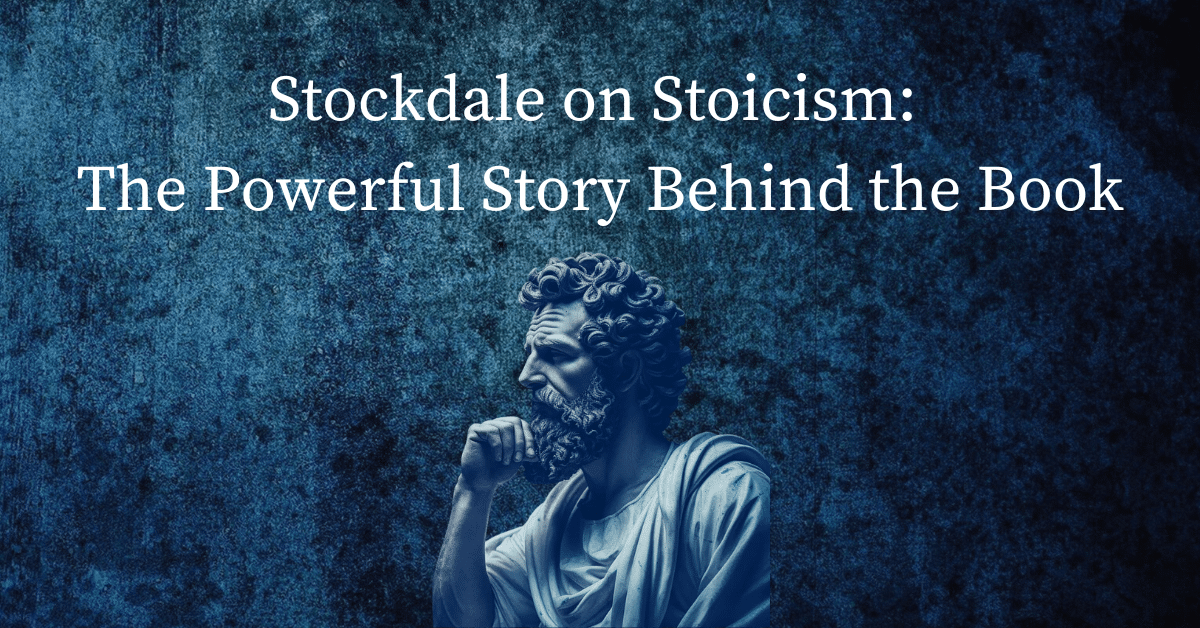
Though James Stockdale might not be a household name, his story is one that everyone even slightly interested in Stoicism will want to hear. In this post, we’ll take a closer look at the writing of this incredible figure entitled Stockdale on Stoicism.
Stockdale was taken prisoner after his Skyhawk was struck by enemy fire and disabled. For seven and a half years, he was a POW in the infamous “Hanoi Hilton” prison camp. Using the teachings of Epictetus and other Stoic philosophers, Stockdale could endure some of the most brutal experiences anyone could imagine.
We’ve talked a lot about how Stoicism is a practical philosophy that you can apply to your everyday life; for many, this might mean applying Stoic principles to dealing with a job loss, the end of a relationship, or the death of a loved one. Through the example of James Stockdale, we see just how powerful Stoicism can be even when faced with the most unthinkable horrors.
Born just before Christmas in 1923, James Stockdale was a highly decorated United States Navy vice admiral and aviator. Perhaps best known for having been a prisoner of war during the Vietnam War, his life and career are characterized by his resilience, courage, and leadership.
Stockdale first “came to the philosophic life as a thirty-eight-year-old naval pilot in grad school at Standford University,”-- the opening line to his essay “Courage Under Fire: Testing Epictetus’s Doctrines in a Laboratory of Human Behavior."
Stockdale graduated from the U.S. Naval Academy in 1947 and became a naval aviator. He served in various roles, including as a test pilot, before deploying to the Vietnam War.
Captured and taken as a prisoner of war in 1965, Stockdale’s leadership and resilience during this time were truly remarkable. He organized resistance among his fellow prisoners and established a code of conduct to help them withstand their ordeal, all while using Stoicism to help him cope with the extreme adversity he was facing.
For his extraordinary valor and leadership in captivity, Stockdale was awarded the Medal of Honor, the highest military decoration in the U.S., in 1976. He went on to continue his military career until his retirement from the Navy in 1979. Another notable venture of Stockdale’s was his candidacy as vice-president alongside Ross Perot in the 1992 presidential election.
On September 9, 1965, Stockdale's A-4 Skyhawk was shot down over North Vietnam. He was captured by the North Vietnamese and held as a POW in the infamous Hỏa Lò Prison, often referred to as the "Hanoi Hilton." There, he endured seven and a half years of brutal captivity and torture.
Despite the extreme adversity of the situation, Stockdale emerged as a leader among the POWs. He organized a system of communication between the prisoners, known as the "tap code," which allowed them to communicate with each other and maintain a sense of unity. He also established a code of conduct, which emphasized resistance and solidarity among the prisoners.
The code of conduct also focused on the importance of maintaining honor and dignity in captivity. If you’re familiar with the ideas of Stoicism, it may not come as a surprise to you that Stoicism in general and Epictetus, in particular, played a significant role in helping him cope with the extreme suffering and uncertainty of his situation. He often turned to Stoic principles to find inner strength, maintain a sense of purpose, and endure the hardships of captivity.
Stockdale was released on February 12, 1973, when the U.S. signed the Paris Peace Accords, ending American involvement in the Vietnam War. After his release, he continued his military career and retired from the U.S. Navy in 1979, eventually achieving the rank of vice admiral.
James Stockdale published a number of writings and gave numerous lectures during his life. Two writings, Stockdale on Stoicism I: The Stoic Warrior’s Triad and Stockdale on Stoicism II: Master of My Fate, were published by the Center for The Study of Professional Military Ethics as a part of their “Occasional Paper” series.
The Stoic Warrior’s Triad: Tranquility, Fearlessness, and Freedom was actually initially delivered as a lecture to the students at The Marine Amphibious Warfare School in the mid-90s.
In this speech, he expresses that “war is an act of violence to compel the enemy to do your will” (a quote from Clausewitz) and that the “most important weapon in breaking people’s wills” is “holding the moral high ground.” In fact, he states that this is “more important than firepower.”
Stockdale goes on to say, “Mind games are important, and you have to play them honestly and seriously in this business.” He then says that he’s going to focus on what he calls a “major mind game,” Stoicism.
“…I was a changed and better man for my introduction to philosophy, and especially to Epictetus.”
- James Stockdale, Courage Under Fire
James Stockdale was deeply impressed by the writings of Epictetus when he first encountered them. In fact, he goes on to say the following to the students he was addressing:
“To get my message today, you have only to have a general understanding of the message of one man: the Stoic philosopher Epictetus, the outstanding pagan moralist of the Roman Empire.”
- James Stockdale, Stockdale on Stoicism I: The Stoic Warrior’s Triad
You can get a better sense of the way that Stockdale saw Epictetus from the following passage:
“Epictetus was impatient with unmanliness and loose living. He had a sarcasm that stripped affection bare. He had a fiery earnestness, which robbed his rude strokes of their cruelty. His message: " A man must think hard and live simply to do well."
- James Stockdale, Stockdale on Stoicism I: The Stoic Warrior’s Triad
Stockdale describes his relationship with Epictetus as a war in itself, saying:
“Everything I know about Epictetus I've developed myself over the years. It's been a one-on-one relationship. He's been in combat with me, leg irons with me, spent month-long stretches in blindfolds with me, has been in the ropes with me, has taught me that my true business is maintaining control over my moral purpose, in fact that my moral purpose is who I am. He taught me that I am totally responsible for everything I do and say; and that it is I who decides on and controls my own destruction and own deliverance. Not even God will intercede if He seesme throwing my life away. He wants me to be autonomous. He put me in charge of me. "It matters not how straight the gate, how charged with punishment the scroll. I am the master of my fate, I am the captain of my soul.”
- James Stockdale, Stockdale on Stoicism I: The Stoic Warrior’s Triad
This powerful lecture on the value of Stoic thought ends with Stockdale expressing three key ideas that we can all benefit from:
- James Stockdale, Stockdale on Stoicism I: The Stoic Warrior’s Triad
Stockdale describes himself as a “philosophical fighter pilot,” and the two Stockdale on Stoicism show that this is, in fact, an apt way to label this great man. This second paper takes us into his experience in the Hanoi Hilton and how he actually applied the principles of Stoicism to this unthinkable horror.
This writing is titled in full Master of My Fate: A Stoic Philosopher in a Hanoi Prison. He begins by talking about how he was first introduced to Stoicism and exploring the application of Epictetus’ Enchiridion as a legitimately useful handbook to life.
He goes on to talk about how Epictetus drew crowds much like those of Socrates– “young aristocrats destined for careers in finance, the arts, public service.” The curriculum of Epictetus wasn’t about "revenues or income, or peace or war, but about happiness and unhappiness, success and failure, slavery and freedom." The ideal graduate of Epictetus’ teachings wasn’t someone who could go on and on about philosophical concepts in a lecture hall or at a party but someone who was:
"...able to speak fluently about philosophic principles as an idle babbler, but about things that will do you good if your child dies, or your brother dies, or if you must die or be tortured. ...Let others practice lawsuits, others study problems, others syllogisms; here you practice how to die, how to be enchained, how to be racked, how to be exiled."
Stockdale then goes on to discuss his experience in the Hanoi prison in great detail. He discusses how he took some of the core thoughts of Epictetus with him into the gruesome experience and his own mission in prison, how they “organized a clandestine society” of prisoners through a wall tap code, the torture he and other prisoners endured, and so much more. His time in the Hanoi Hilton is something that most of us can hardly even imagine.
To end the piece, he discusses how he received a note from a fellow prisoner, Dave Hatcher, through their secret communication system. Written with rat droppings on low-grade paper toweling were the last lines of the Stoic poem Invictus:
“It matters not how strait the gate,
How charged with punishment the scroll,
I am the master of my fate:
I am the captain of my soul.”
Now that we've taken a closer look at Stockdale on Stoicism let's break down some of the key aspects of Stockdale's philosophy.
“The Stoics were the ultimate warriors.”
- James Stockdale, Courage Under Fire
Stockdale saw life itself as a war, with each of us a soldier.
"Do you not know that life is a soldier's service? One must keep guard, another go out to reconnoiter, another take the field. If you neglect your responsibilities when some severe order is laid upon you, do you not understand to what a pitiful state you bring the army in so far as in you lies?”
- Epictetus
It's easy to see the principles of Stoicism and feel they are a bit out of reach for actual life. When you dig in and become familiar with the essential aspects of Stockdale's Stoicism, however, and how he maintained the moral high ground while a POW, our excuses don't seem to be standing on particularly firm ground.
Inner freedom was a central tenet of James Stockdale's Stoic philosophy and a key aspect of his ability to cope with the extreme adversity he faced as a prisoner of war in North Vietnam. He believed that while his captors could control his physical environment, they could not control his thoughts, beliefs, or inner world. He recognized that his mind was his last bastion of personal freedom, and he fiercely protected this mental territory.
"A man's master is he who is able to confer or remove whatever that man seeks or shuns. Whoever then would be free, let him wish nothing, let him decline nothing, which depends on others; else he must necessarily be a slave.”
- Epictetus
As a prisoner of war, Stockdale was subjected to relentless psychological manipulation, including threats, propaganda, and forced confessions. However, he maintained his inner freedom by refusing to let their tactics influence his core beliefs and values.
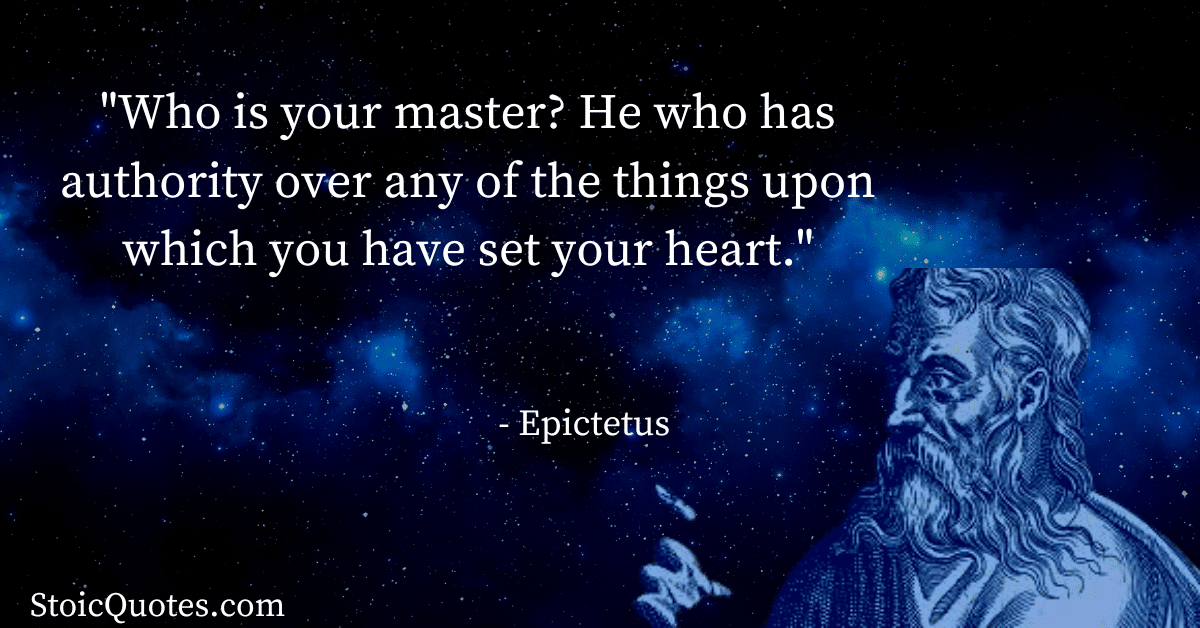
"Who is your master? He who has authority over any of the things upon which you have set your heart."
- Epictetus
Stockdale uses the above quote to describe what he calls “the real core of what a person needs in order to understand the POW situation.”
Inner freedom is also an essential component of the moral integrity Stockdale displayed during his time as a prisoner. Even in the most challenging situations, he recognized that inner freedom meant staying true to his principles and ethics, regardless of external pressures.
Of course, no one can make it through seven and a half brutal years of torture and inhumanity without the ability to endure such hardships. James Stockdale's story of endurance and resilience in the face of unimaginable adversity serves as a powerful testament to the practicality and effectiveness of Stoic philosophy. His ability to endure suffering, maintain his moral compass, and inspire his fellow prisoners is a remarkable example of how Stoicism can be a guiding philosophy in times of extreme adversity.
Few people would give Stockdale a hard time for feeling like a victim while he was a POW in Vietnam, but he wouldn’t allow this for himself.
“Each individual brings about his own good and his own evil, his good fortune, his ill fortune, his happiness, and his wretchedness. It is unthinkable that one man's error could cause another's suffering; suffering, like everything else in stoicism, was all intemal- remorse at destroying yourself.”
- James Stockdale, Courage Under Fire
Stockdale applied this principle by taking full responsibility for his response to the brutal conditions of captivity. He recognized that he couldn't control the actions of his captors or the conditions of the prison, but he could control how he responded to them. This sense of personal responsibility enabled him to maintain his dignity and resilience, even in the face of extreme adversity.
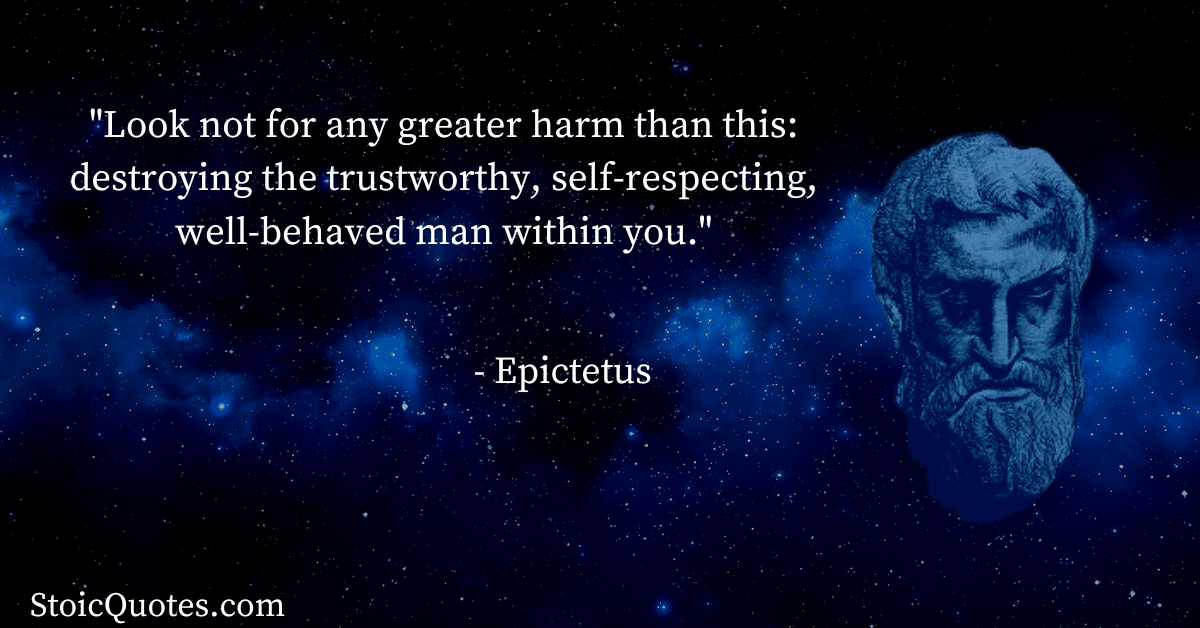
“Look not for any greater harm than this: destroying the trustworthy, self-respecting, well-behaved man within you."
- Epictetus
In a truly inspiring manner, Stockdale maintained his ethical and moral responsibilities even in the most challenging circumstances. He refused to collaborate with his captors, demonstrating his unwavering commitment to his country and his values. His sense of moral responsibility extended beyond personal survival to the broader principles he held dear.
Stockdale also stressed the importance of being honest with oneself rather than deceiving oneself.
"It is neither death, nor exile, nor toil, nor any such things that are the cause of your doing, or not doing anything, but only your opinions and the decisions of your Will."
- Epictetus
Stockdale firmly believed in confronting the harsh realities of his situation. As a practicing Stoic, he embraced the practice of viewing situations objectively, free from wishful thinking or denial. He refused to engage in self-deception, recognizing that it would only lead to suffering and a distorted view of reality. By being honest with himself about the severity of his captivity and the uncertainty of his future, Stockdale was better equipped to cope with the challenges he faced.
None of us want to face hard times, but the truth is that adversity is one of the primary vehicles through which we grow and progress as personalities.
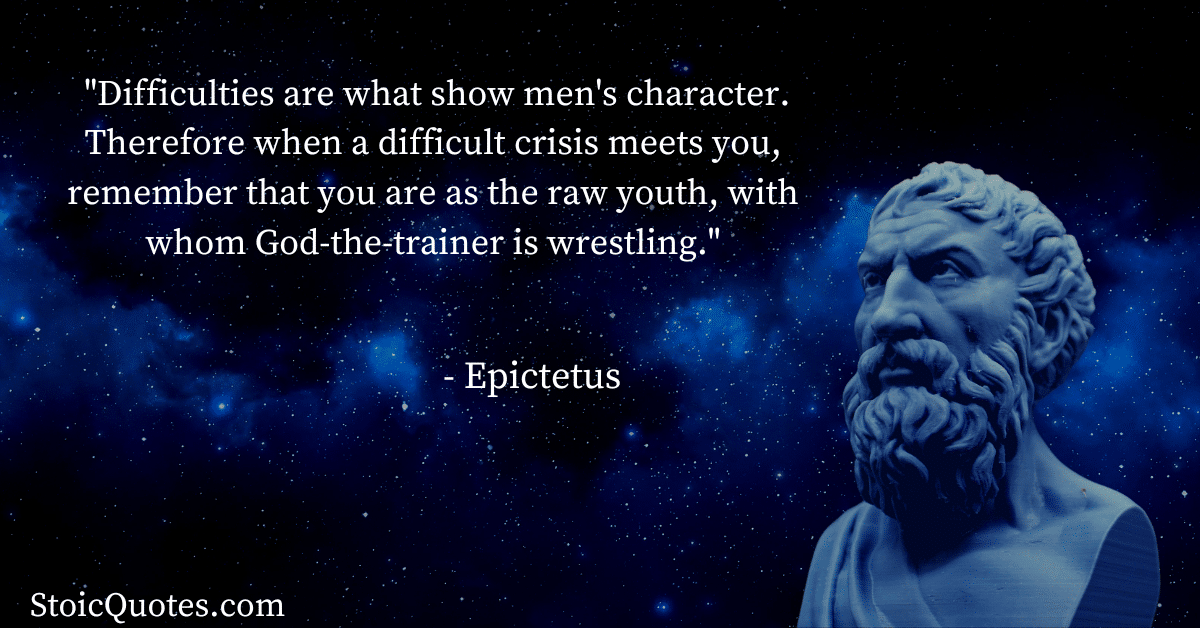
"Difficulties are what show men's character. Therefore when a difficult crisis meets you, remember that you are as the raw youth, with whom God-the-trainer is wrestling."
- Epictetus
Stockdale's ability to grow through adversity is rooted in his resilience. His experiences as a POW provided him with one of the most extreme testing grounds for Stoic resilience. He viewed adversity as an opportunity to develop and strengthen his character.
Furthermore, he fully embraced the concept of the dichotomy of control while in captivity. By focusing on his response to adversity rather than futilely trying to change his circumstances, he was able to find growth and empowerment in some of the most impossibly challenging situations.
Stockdale recognized that his hardships in captivity provided valuable life lessons. He saw the suffering not as a pointless ordeal but as an opportunity to gain wisdom and insight. This perspective allowed him to grow as a person, both during and after his captivity.
Self-discipline can get a bad rap these days in our culture of hedonism and instant gratification. James Stockdale is an excellent example of how one can use discipline to endure the most extreme circumstances and come out on top in the end.
“The Stoic demand for disciplined thought naturally won only a small minority to its standard, but those few were the strongest characters of that time. In theory a doctrine of pitiless perfectionism, Stoicism actually created men of courage, saintliness, and goodwill.”
- James Stockdale, Courage Under Fire
As a prisoner of war, Stockdale had to discipline himself to manage his basic needs, including hunger, thirst, and physical discomfort. By exercising self-discipline, he could maintain a sense of dignity and focus on more important aspects of his life and survival.
Stockdale's ability to maintain mental resilience in the face of brutal captivity is rooted in his self-discipline. He had the self-control to keep his mind focused on constructive thoughts rather than dwelling on negative emotions or fear. This discipline allowed him to endure prolonged isolation and torture, remaining mentally composed and determined.
We’ve talked a lot about the notion of accepting and embracing one’s fate, a concept referred to as amor fati. At the same time, few of us have ever had to learn to accept or even love a reality so extreme as the one Stockdale experienced.
“Every one of us, slave or free, has come into this world with innate conceptions as to good and bad, noble and shameful, becoming and unbecoming, happiness and unhappiness, fitting and inappropriate. ...If you regard yourself as a man and as a part of some whole, it is fitting for you now to be sick and now to make a voyage and run risks, and not to be in want, and on occasion to die before your time. Why, then, are you vexed? Would you have someone else be sick of a fever now, someone else go on a voyage, someone else die? For it is impossible in such a body as ours, that is, in this universe that envelopes us, among these fellow creatures of ours, that such things should not happen, some to one man, some to another.”
– Epictetus
Stockdale applied this concept by accepting the harsh conditions of his captivity, including the physical and psychological hardships. He did not dwell on the past or fixate on an uncertain future– instead, he focused on living in the reality of the present.
In fact, Stockdale was able to find freedom in accepting his reality. His acceptance of reality gave him a mental and emotional freedom that allowed him to maintain a sense of dignity and resilience even in the face of brutal captivity.
No one would blame Stockdale for feeling like life was meaningless after spending several years being tortured and deprived in the most basic ways. However, he didn’t fall prey to this potential– instead, he was able to find purpose and meaning in the midst of extreme adversity.
Stockdale believed that his purpose was to maintain his moral and ethical principles, even in captivity. His commitment to these values gave his suffering a profound sense of meaning and purpose, as he saw himself as upholding a higher duty to his country and fellow prisoners.
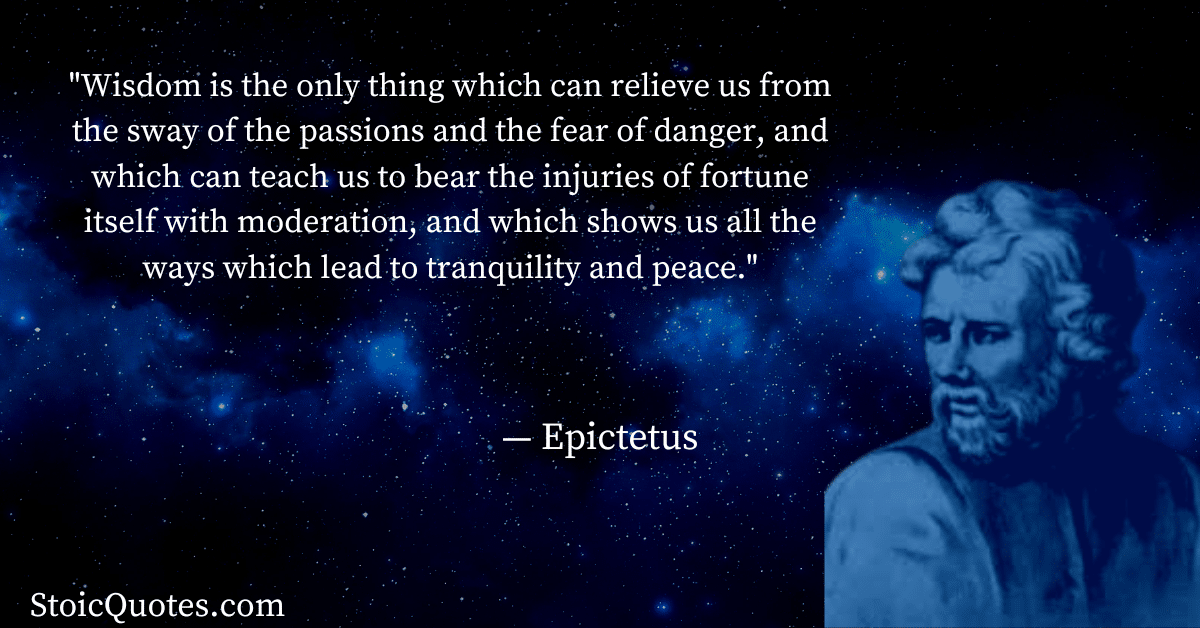
"Wisdom is the only thing which can relieve us from the sway of the passions and the fear of danger, and which can teach us to bear the injuries of fortune itself with moderation, and which shows us all the ways which lead to tranquility and peace."
- Epictetus
His sense of purpose extended to his leadership role among fellow prisoners. He saw it as his duty to set an example and inspire others to maintain their own sense of purpose and dignity. By leading with integrity and Stoic principles, he encouraged his fellow prisoners to endure with grace and strength– no small feat in such circumstances.
Stockdale didn't treat Stoicism as a mere academic or theoretical exercise. He lived and applied its principles to his daily life. He saw philosophy as a practical guide for navigating life's challenges and used Stoicism as a means of attaining wisdom, resilience, and personal growth.
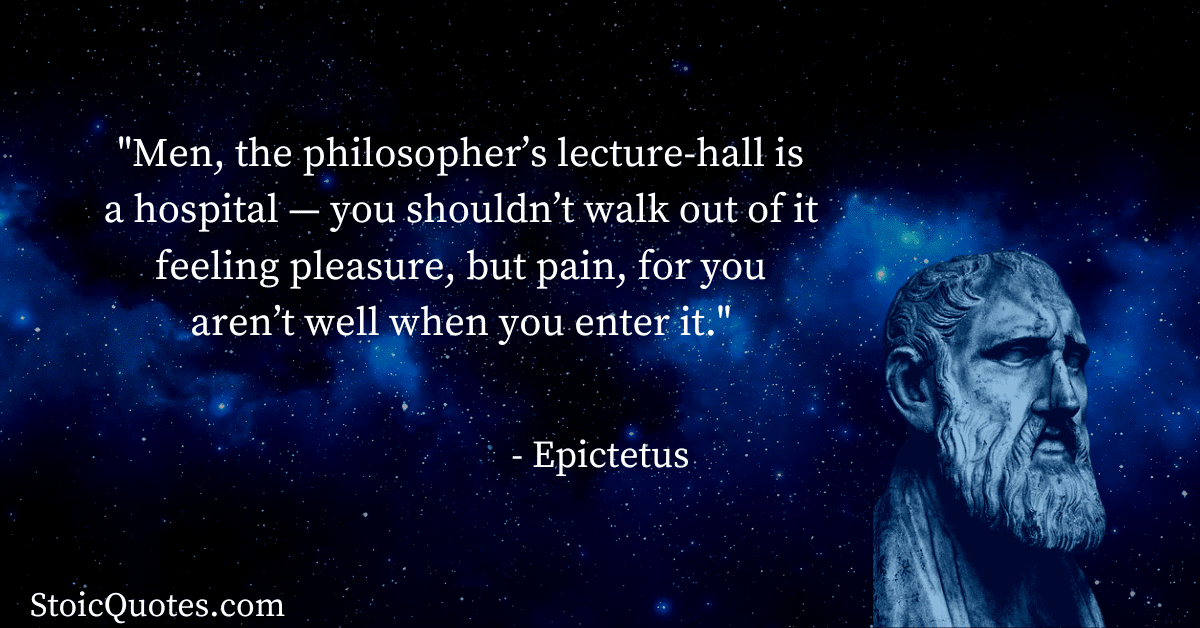
“Men, the philosopher’s lecture-hall is a hospital — you shouldn’t walk out of it feeling pleasure, but pain, for you aren’t well when you enter it.”
- Epictetus
Stockdale doesn’t just talk about concepts like mental resilience, leading by example, accepting reality, and moral integrity. He put them into practice.
He didn’t just stop with the practical application of this philosophy to his life once he was released; he continued to apply Stoicism to his life until his death in 2005.
After he was free, Stockdale authored books and gave lectures, sharing the lessons he learned during captivity and demonstrating how philosophy could be practically applied to lead a life of virtue and resilience. His contributions to the field of philosophy and leadership extended far beyond the prison walls and provided countless lessons for us to learn to this day.
A crucial aspect of how Stockdale managed to survive his experience in the prison camps of North Vietnam has been deemed “the Stockdale Paradox.” This name was coined in the famous Jim Collins book Good to Great.
On Collins’ website, he summarizes the Stockdale Paradox as follows:
“You must maintain unwavering faith that you can and will prevail in the end, regardless of the difficulties, and at the same time, have the discipline to confront the most brutal facts of your current reality, whatever they might be.”
Stockdale relayed the reality of this paradox to Collins in a conversation where Collins asked which prisoners didn’t make it out of the brutal Hanoi Hilton. Stockdale responded as follows:
“Oh, that's easy, the optimists. Oh, they were the ones who said, 'We're going to be out by Christmas.' And Christmas would come, and Christmas would go. Then they'd say, 'We're going to be out by Easter.' And Easter would come, and Easter would go. And then Thanksgiving, and then it would be Christmas again. And they died of a broken heart. This is a very important lesson. You must never confuse faith that you will prevail in the end—which you can never afford to lose—with the discipline to confront the most brutal facts of your current reality, whatever they might be.”
Essentially, you can’t lie to yourself and tell yourself that everything is going to work out fine when the sky is obviously falling on your head. You have to confront what is happening and be honest with yourself. At the same time, you have to faith that you will, ultimately, prevail.
James Stockdale was a truly remarkable figure whose life and experience we can all learn from. He endured extreme brutality while a prisoner of war in North Vietnam and, in the face of this hardship, applied the ideas of Stoicism rather than allowing himself to be crippled. He didn't self-victimize but instead became a leader. He didn't give up hope, but he also was willing to confront the harsh reality of his situation.
Philosophy gets a bad rap as just being a bunch of fun mind games to play-- an education in philosophy is often thought of as something that doesn't have much bearing on our actual lives. Through the example of James Stockdale, however, we see that Stoicism can be practically applied to our experiences, whether they are mundane or extreme.
Are you interested in using Stoicism to live a virtuous, good life? Are you ready to walk the path of self-improvement rather than wallowing in hedonism and instant gratification? If so, make sure you check out the rest of our Stoic Quotes blog for more information, inspiration, and philosophical musings.
We encourage you to share this article on Twitter and Facebook. Just click those two links - you'll see why.
It's important to share the news to spread the truth. Most people won't.